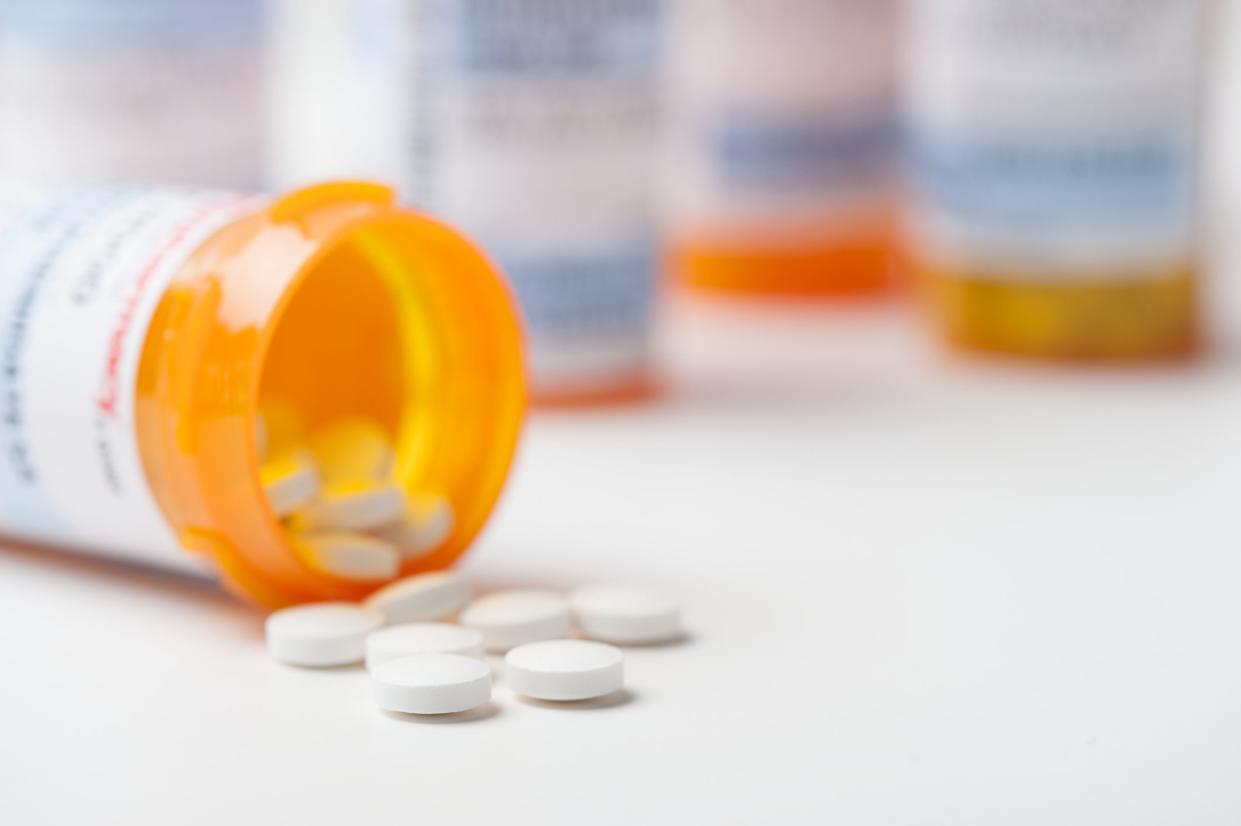Minoxidil vs. Rogaine: What's The Difference for Hair Growth?
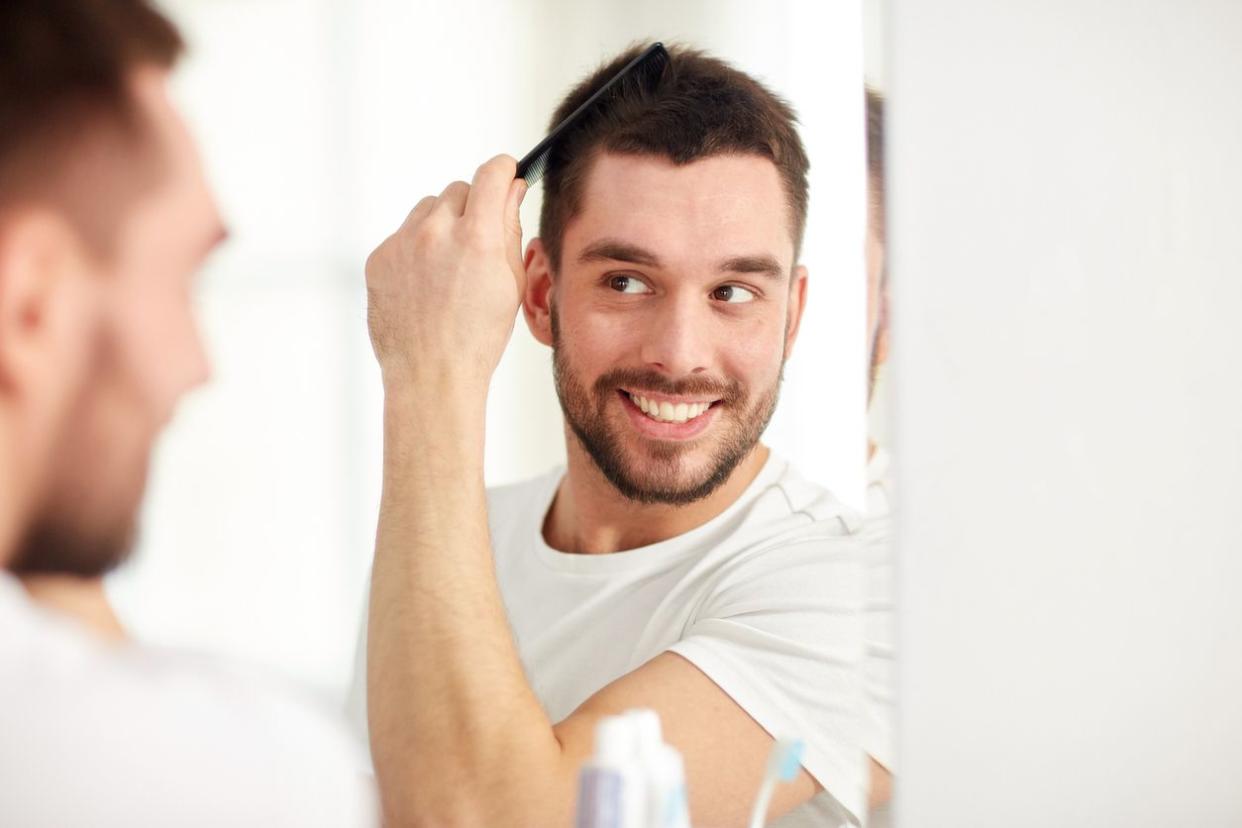
Growing up, you may have longed for the new cool Nikes, but instead your parents got you the knockoffs that were on sale. Truth is, both sneakers were likely comfortable and got the job done, and we doubt that either actually helped your jumpshot.
You’re older (and hopefully wiser) now. And you likely know that many times, the generic stuff is as good as the brand name— no matter what 12-year old you believed. If male pattern baldness or hair thinning is something you’re currently dealing with, researching hair loss treatments can feel overwhelming. Don’t worry, we’re here to help.
In this article, we’ll break down the efficacy of generic minoxidil (also commonly sold as the brand name Rogaine®), along with other popular hair loss treatments for men.
How Effective is Rogaine vs. Minoxidil?
If you’re seeing a receding hairline, some diffuse thinning over the top of the head or a wider part, chances are you’re dealing with male pattern hair loss (also known as androgenetic alopecia), the most common form of hair loss in men.
But many different types of hair loss can occur, from the stress-related hair loss known as telogen effluvium to traction alopecia, which can be caused by tight hairstyles.
Whether it’s used in its FDA-approved form for androgenetic alopecia or off-label for other causes of hair thinning, minoxidil is a gold standard among dermatologists for treating hair loss.
It was originally developed as an antihypertensive drug — increased hair growth was basically a happy accident, which led to the hair growth formulations you see today. While its mechanism of action isn’t totally understood, there are some things we do know.
Topical minoxidil works as a hair growth stimulator — think of it like fertilizer for your roots. This medication shortens the telogen (resting) phase, which causes dormant hair follicles to enter into the anagen, or growth phase earlier than they otherwise would. It also makes the anagen phase last longer, so hair has more time to grow. This allows for increased hair length and diameter.
Yes, sign us up now, please (just kidding, we’ve already subscribed of course).
Adding to its effects is minoxidil’s function as a vasodilator, and its ability to open up the potassium channels of hair follicles. It is believed that by widening the blood vessels and opening up the potassium channels, minoxidil allows more nutrients, blood and oxygen to flow into the hair follicle.
This stimulates circulation near the hair follicles, which may lead to hair growth. It may also prevent androgen (a male hormone) from affecting your already androgen-sensitive follicles. And as a foaming agent or topical solution, minoxidil can also directly stimulate hair follicles and delay their aging.
We’ve been using “minoxidil” here, but now you may be wondering who reigns supreme — Rogaine or minoxidil? Or is Rogaine minoxidil in a different form?
Rogaine, which is well-known for treating hair loss, is a brand name drug that has minoxidil as the active ingredient. But minoxidil is also sold in its generic forms by various brands, including Hims. So whether you go brand name or for the generic, both contain the same active ingredient.
That said, minoxidil comes in different strengths, so that may be where you see a difference in how your hair responds.
In one 48-week randomized study, 393 men used either a 2% minoxidil solution or 5% minoxidil solution for treatment of androgenetic alopecia. The study concluded that the 5% solution was superior and led to a higher hair count than the 2% solution.
It’s also worth noting that these 5% solution users had an increase of pruritus (otherwise known as itchiness) and local irritation. Ah, the price of beauty.
You can learn more about which formula might be right for you in our guide to minoxidil foam vs liquid.
In another study to test how effective minoxidil is for treating hair loss along the hairline (the frontotemporal region) and around the highest point of the scalp toward the back of the head (the vertex), 70 men were given 5% minoxidil or a placebo treatment.
Twenty-four weeks after using either product twice daily, the patients who used the 5% minoxidil formulations had a significant increase in hair density and width.
What Works Better Than Minoxidil (Rogaine)?
Alright, alright, we think we’ve made the point that minoxidil is basically the Leonardo DiCaprio of hair loss treatments — versatile, easygoing and superrrr popular (with the girls, too). That said, there are some great supporting actors to consider for thinning hair, especially finasteride.
Another popular pick for male hair loss, finasteride stops hair loss in a different way than minoxidil. If you’re dealing with androgenetic hair loss or male pattern balding, blame it on the hormones — this type of hair loss happens when testosterone converts to dihydrotestosterone (DHT), causing androgen-dependent miniaturization of scalp hair follicles.
Translation: your follicles shrink and produce thinner and thinner hairs over time.
That’s where finasteride comes in — it inhibits type II 5alpha-reductase, which is what converts testosterone to DHT. In one study, men with male pattern hair loss who took finasteride at dosage of 1mg daily had an improvement in hair growth and increased hair count in clinical trials over two years.
Deciding between finasteride and minoxidil is really a personal choice and your dermatologist or healthcare professional can help you determine what’s right for you. You can also learn more in our guide minoxidil vs finasteride for even more intel on these popular hair loss treatments.
An interesting thing to note, however, is that finasteride and minoxidil can be used together, as confirmed by many studies. One such study of 450 Chinese men with male androgenetic alopecia tested finasteride, minoxidil and the combined medication of finasteride and minoxidil.
The study reported that the combined medication had the best end results for patients.
(Related: Finasteride & Minoxidil: The Most Effective Hair Loss Combo?)
Side Effects of Minoxidil vs Rogaine
Remember, minoxidil and Rogaine have the same active ingredient, so they’ll have the same side effects. While long-term studies have shown minoxidil to being safe and well-tolerated, some side effects can include:
Irritant contact dermatitis
Itching
Scaling
Initial shedding
These side effects may occur either because of an allergic reaction to the inactive agent — propylene glycol — or to the minoxidil itself. This condition has been observed most frequently with the 5% minoxidil topical solution.
Also, when you first start using minoxidil, you may experience some hair shedding. But hold tight — it does get better. Minoxidil shortens the telogen phase, which may induce telogen effluvium when you first start using it. This shedding will stop, and new (and hopefully more!) hair will grow in its place.
(Related: Can Finasteride Regrow a Receding Hairline?)
The Verdict on Minoxidil vs Rogaine
Here’s the thing — when it comes to hair loss, you can do nothing and hope it grows back (unlikely, tbh), or you can try a hair loss treatment that has the research to back it up and see if that lush head of hair can be restored to its former glory. Doesn’t that second one sound better?
Remember that minoxidil and Rogaine® have the same active ingredient, so you’ll likely get the same great results whether you go brand name or generic. Some options you may want to consider:
Topical finasteride & minoxidil spray. Like we mentioned above, combining these two ingredients basically make a supercharged two-in-one spray to help encourage new hair.
Minoxidil foam. This 5% strength foam can be easily distributed onto the scalp. And remember, all the studies show that 5% formulation is where you’ll see the biggest difference.
Minoxidil solution. If you have a sensitive scalp, then this 2% strength formula with easy-to-use dropper might be the right fit for hair regrowth. It’ll likely cause less irritation for your scalp.
Volumizing shampoo and conditioner. Regardless of which hair loss treatment you try, the right hair care can make a difference, too. Keeping your scalp clean and healthy is the foundation to healthy hair. A volumizing shampoo and conditioner will give limp strands some height and body.
This article originally appeared on Hims.com and was syndicated by MediaFeed.org
More from MediaFeed:
5 Ways Drinking Water May Help You Lose Weight
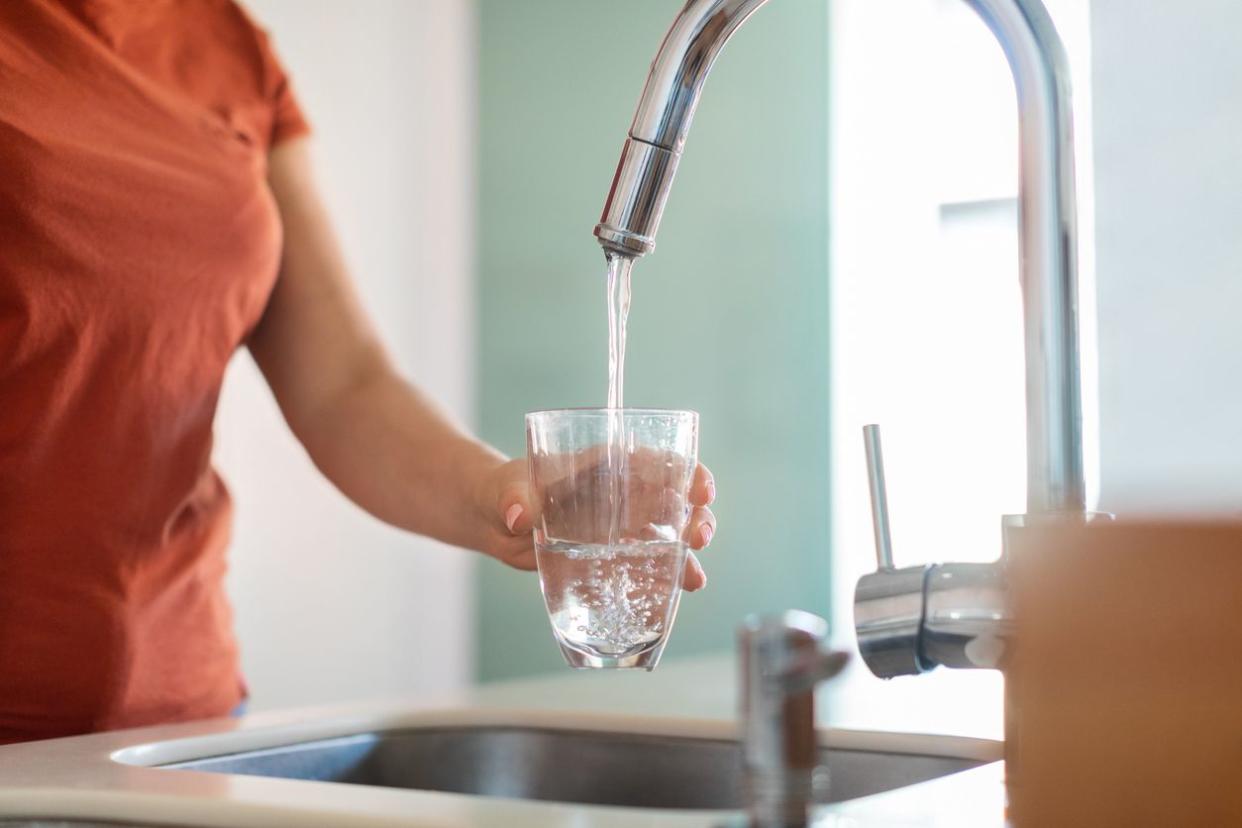
Does drinking water help you lose weight? Believe it or not, it can. While this might sound too good to be true, there’s some solid science behind it.
But it’s not quite as simple as downing a glass of water or two.
Read on to learn how drinking water can help you lose weight, when you should drink it and how much water you should be aiming for.
Prostock-Studio/istockphoto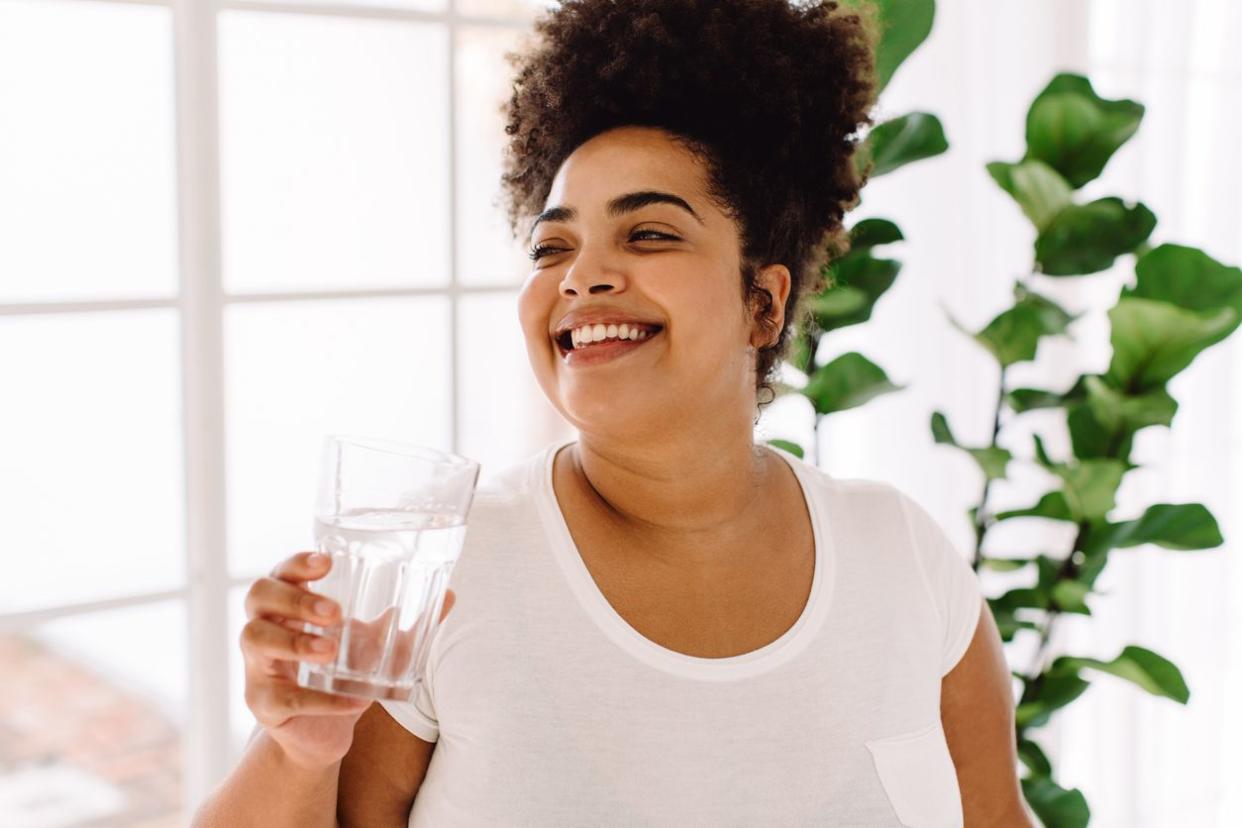
Yes, drinking water can help you lose weight. Research shows it can suppress appetite, stimulate metabolism, boost fat oxidation, reduce liquid calories and make exercising easier.
A 2014 study had 50 female participants with overweight drink roughly 51 ounces on top of their usual daily water intake. This was divided into about 17 ounces a half-hour before breakfast, lunch and dinner. Participants drank the extra water for eight weeks.
At the end of the experiment, their body weight, body mass index (BMI), body fat and appetite had all decreased.
More recent research has had similar findings. A 2022 review of studies concluded that “preloading water” — drinking water before meals — can promote weight loss.
More specifically, drinking about 17 ounces before sitting down to eat may improve weight loss by two to five pounds over three months. Not bad for the humble glass of water.
So, does drinking a lot of water help you lose weight? It looks like it can!
But why does water help you lose weight, and how much water do you need to drink to lose weight? Read on for answers.
(Related:Ozempic Vs. Metformin)
:JLco - Julia Amaral/istockphoto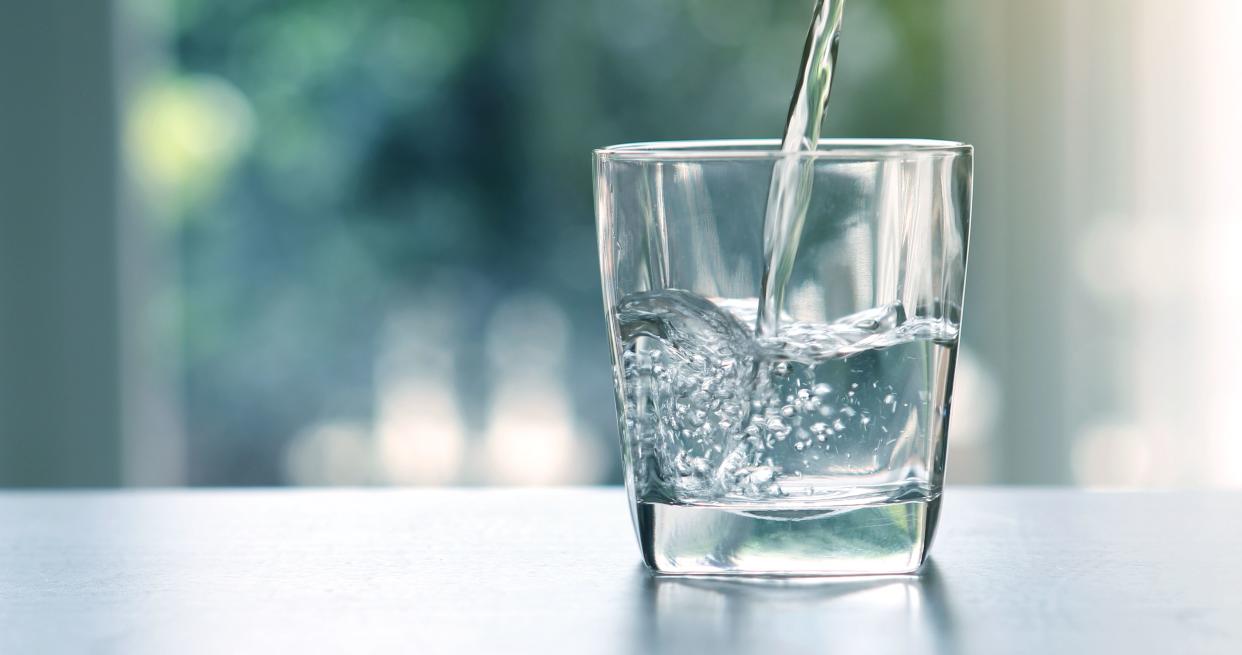
It’s clear that drinking more water can lead to weight loss. But how does water help you lose weight, exactly? It works in a handful of ways.
pinkomelet/istockphoto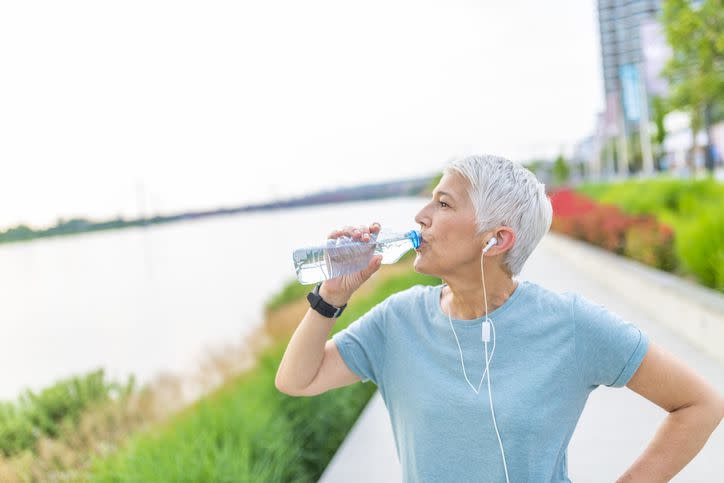
Our brains are clever, complex things, but they often mix up the signals for thirst and hunger. When drinking more water, you’re less likely to feel “hunger” that’s actually just dehydration.
Water may also impact hunger hormones, including:
Ghrelin. This is the hormone that signals hunger to the brain.
Leptin. Leptin is an appetite-suppressing hormone.
Insulin. When insulin is imbalanced, you might feel hungry.
Cholecystokinin. This hormone stimulates the digestion of protein and fat.
Glucagon-like peptide-1. Also called GLP-1, this hormone contributes to feeling full.
In simple terms, drinking more water can suppress appetite while helping you feel fuller and more satisfied at meal times. This can lead to eating less, promoting weight loss.
For example, a 2021 study on people with type 2 diabetes found that drinking about 34 ounces of water a day before meals led to eating fewer calories and less fat. Over eight weeks, this resulted in a lower BMI, a smaller waist circumference and greater weight loss compared to the control group who didn’t drink any water before meals.
Drinking water also seemed to reduce levels of copeptin, a protein that — in high levels — is linked to a larger waist circumference, elevated blood pressure, high BMI and obesity.
dragana991 / istockphoto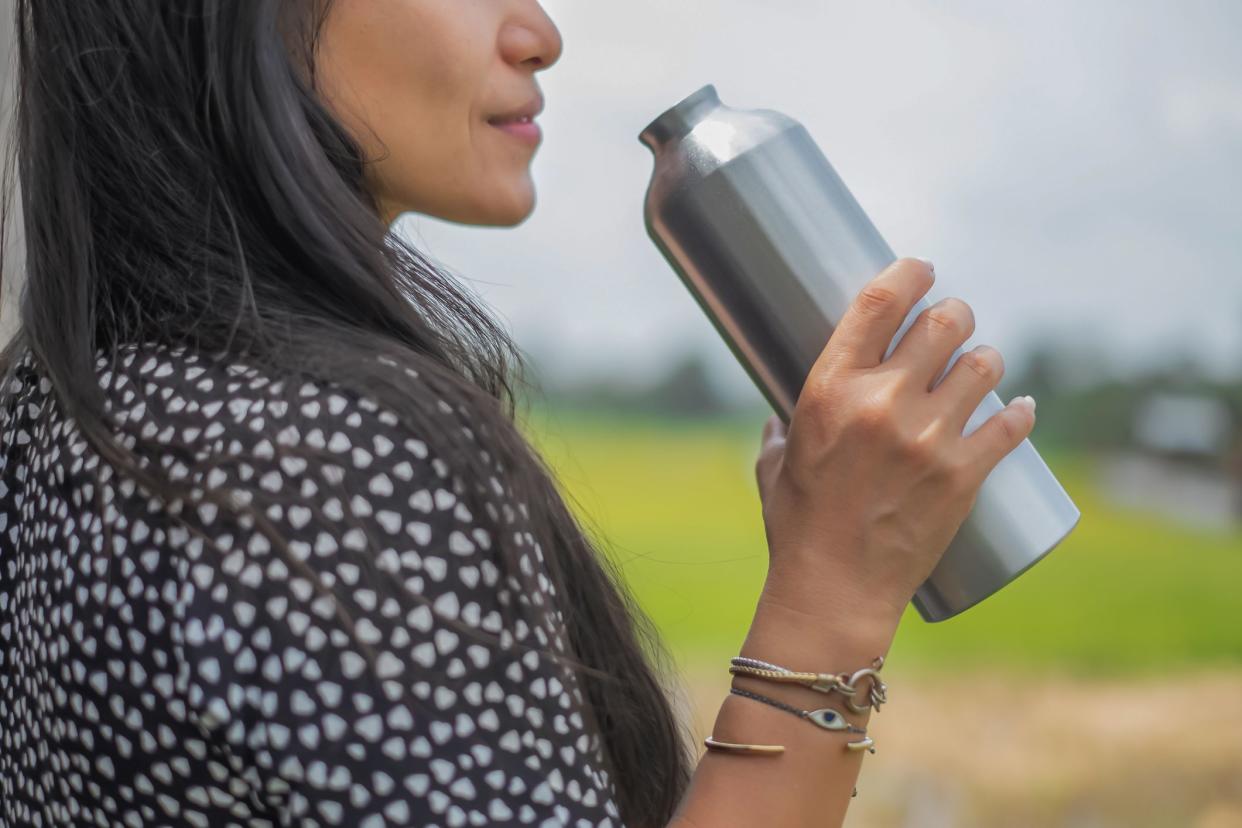
Does water increase metabolism? Again, it sounds like wishful thinking, but the science is there.
Water may boost thermogenesis (heat production) in the body. This, in turn, increases your metabolic rate, providing you with more energy to move and burn off excess weight.
A small 2003 study with 14 participants found drinking around 17 ounces of water increased metabolic rate by 30 percent. The effect started kicking in 10 minutes after drinking water and reached its peak in 30 to 40 minutes.
In absolute terms, the number of calories burned by doing this wasn’t too great, but on a weight loss journey, every bit can matter. Drinking colder water, it seems, burns more calories, because of the energy that needs to go into heating the water up.
Kanawa_Studio/istockphoto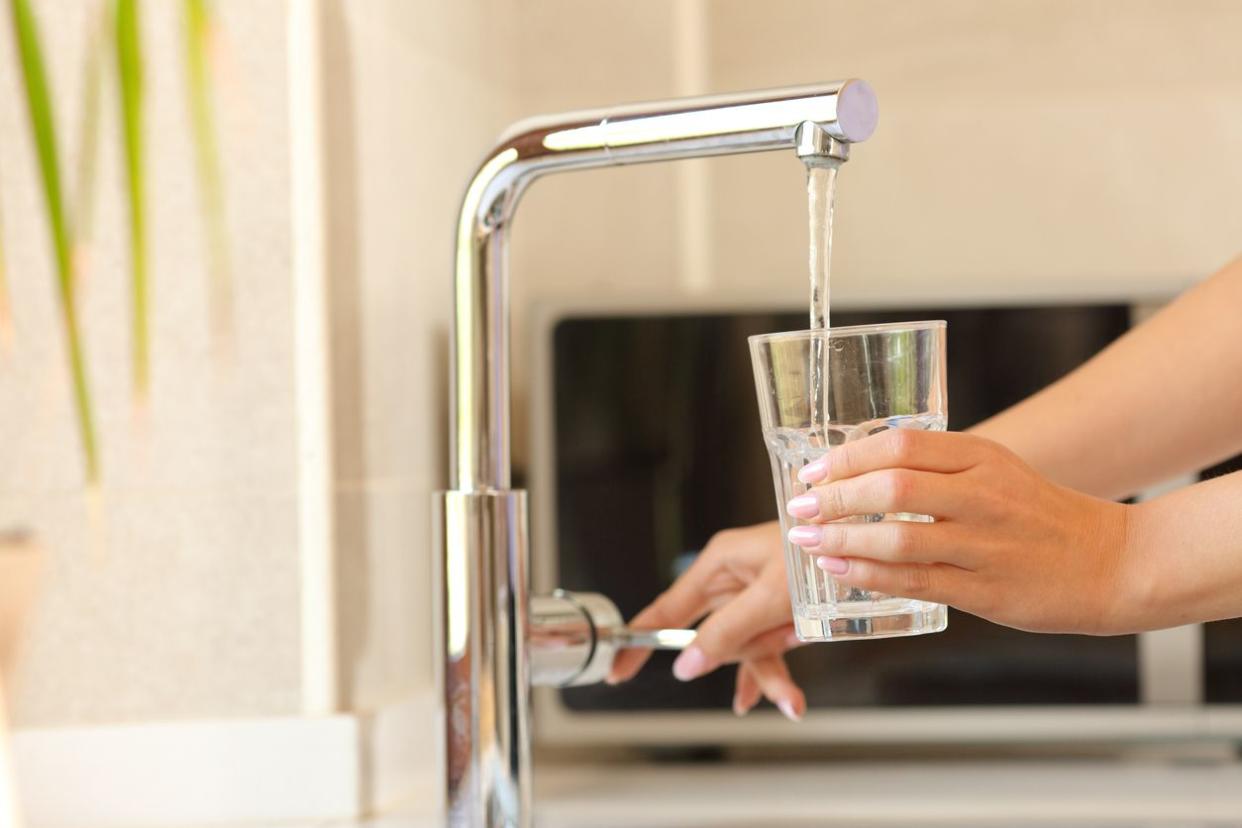
Water may increase the rate of lipolysis — the breakdown of fat for energy in your body.
It becomes easier for your body to break down the fat in free fatty acids and transport it into mitochondria, which turn nutrients into energy in your cells. This means drinking water may increase fat oxidation, when your body burns fat for fuel.
AntonioGuillem/istockphoto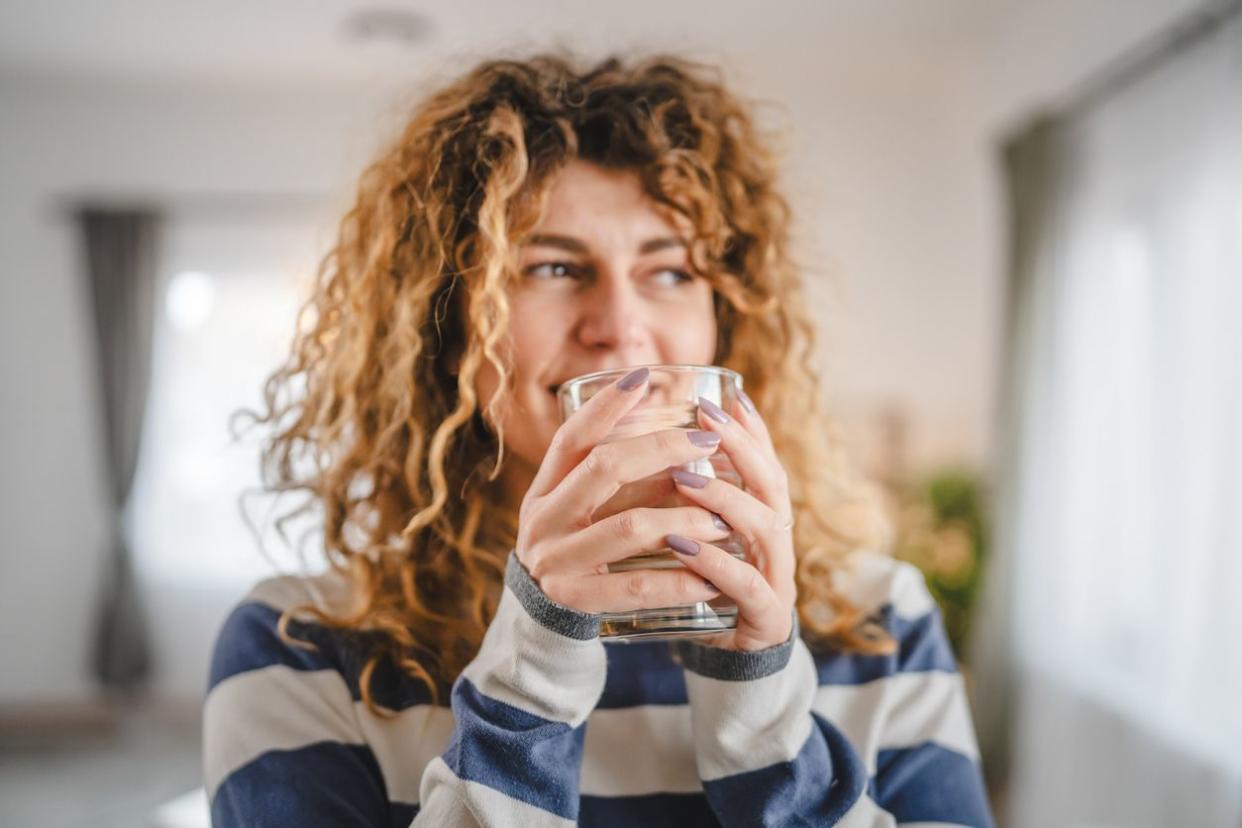
This one’s pretty straightforward. When you’re drinking water, you’re not drinking soft drinks, sugar-laden fruit juices or alcoholic beverages that can contribute to weight gain.
Swapping your usual lunchtime Coke and after-dinner beer for a glass of water is a simple change that cuts calories before you even think about overhauling your diet.
Plus, if you stay hydrated with zero-calorie water, you’re less likely to reach for a high-calorie, sugary drink to quench your thirst.
(Related: Are Diabetes Drugs Safe for Weight Loss?)
:Miljan Živković/istockphoto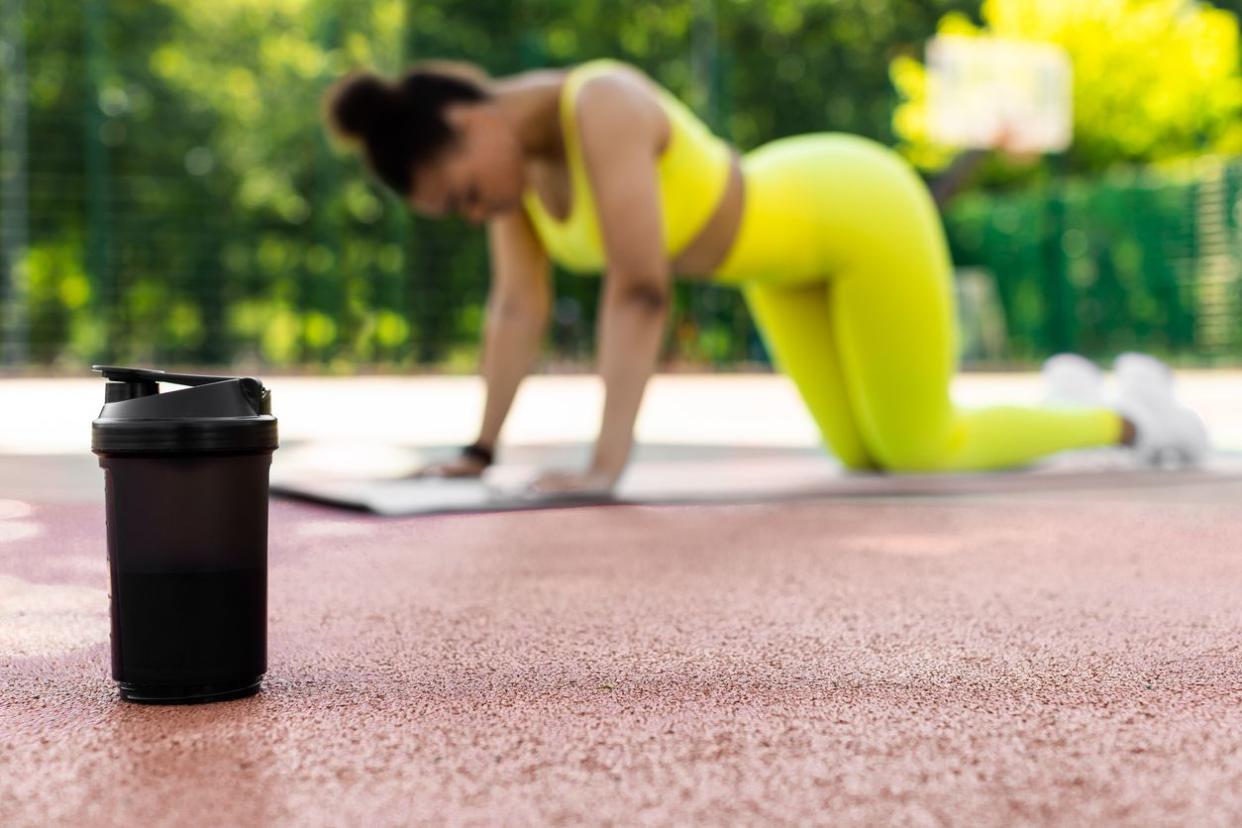
You might be upping your physical activity if you’re trying to shed a few pounds. Drinking water can help make this lifestyle change easier.
Even mild dehydration can lead to:
Reduced endurance
Reduced motivation
Increased fatigue
Increased perceived effort — your workouts feel harder
Drinking enough water can reverse these effects and reduce the oxidative stress that exercise can cause.
When working up a sweat, you’ll lose more water than usual. So it’s even more important to keep a water bottle nearby and make sure you’re sippin’ on it throughout your workout.
Prostock-Studio/istockphoto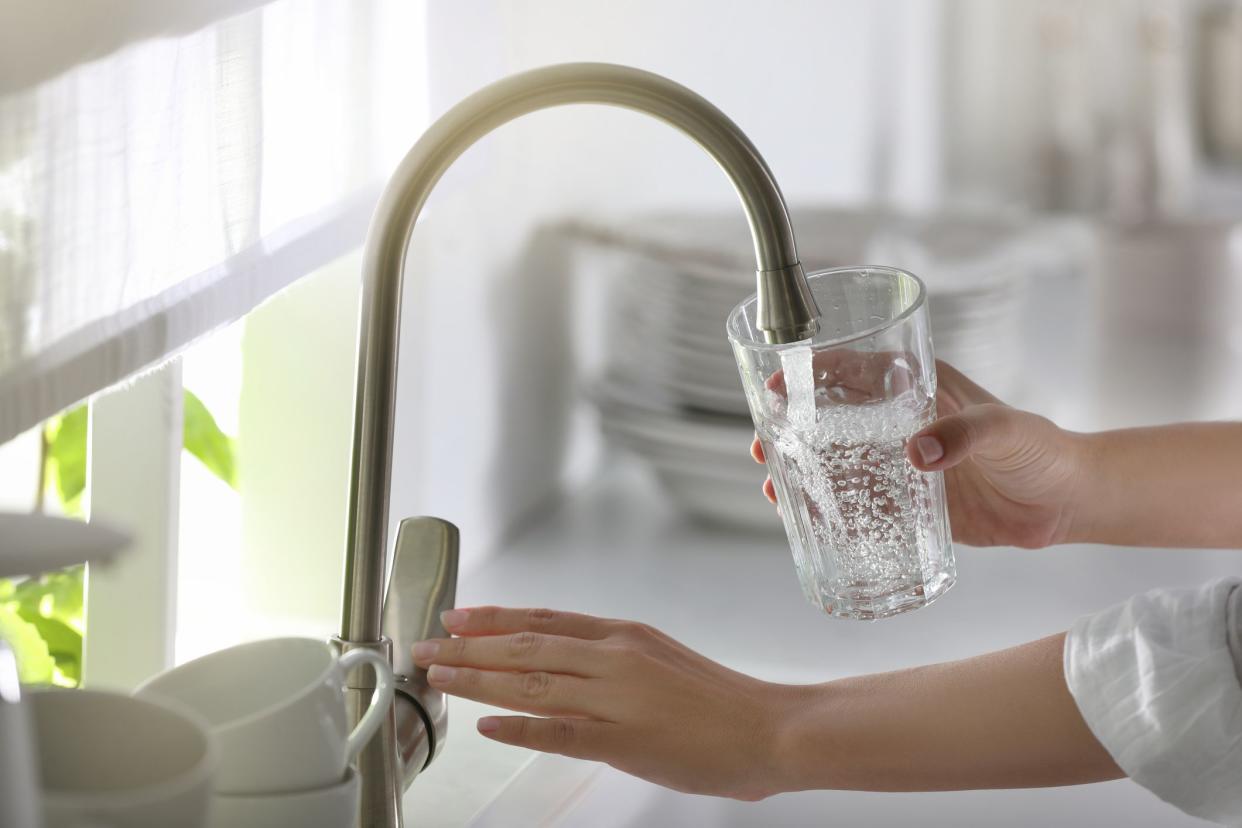
You may have heard you should aim for eight glasses of water a day for optimal health. But there’s actually no hard-and-fast rule about how much water you should drink — and that’s even more true when it comes to water for weight loss.
The National Academies of Sciences, Engineering and Medicine recommends about 91 ounces of water a day for women and 125 ounces for men. However, this is total fluid intake from food and drinks — not just glasses of water alone.
Also, it’s not the same for everyone. How much water you need to lose weight depends on factors like your daily activity levels and how hot it is where you live.
And that’s just thinking about water for general health and well-being. How much water you should drink to lose weight might be whatever’s necessary to suppress appetite and reduce calorie intake — or it could all be about timing (i.e., upping your water intake before meals).
More research is needed on that front.
For now, we say don’t worry too much about how much water a day for weight loss is best. Our advice is to drink when you feel thirsty, check that your pee is clear or light yellow (dark yellow signals dehydration) and consider drinking a little extra before meals to see if it affects your hunger and meal satisfaction.
Liudmila Chernetska/iStock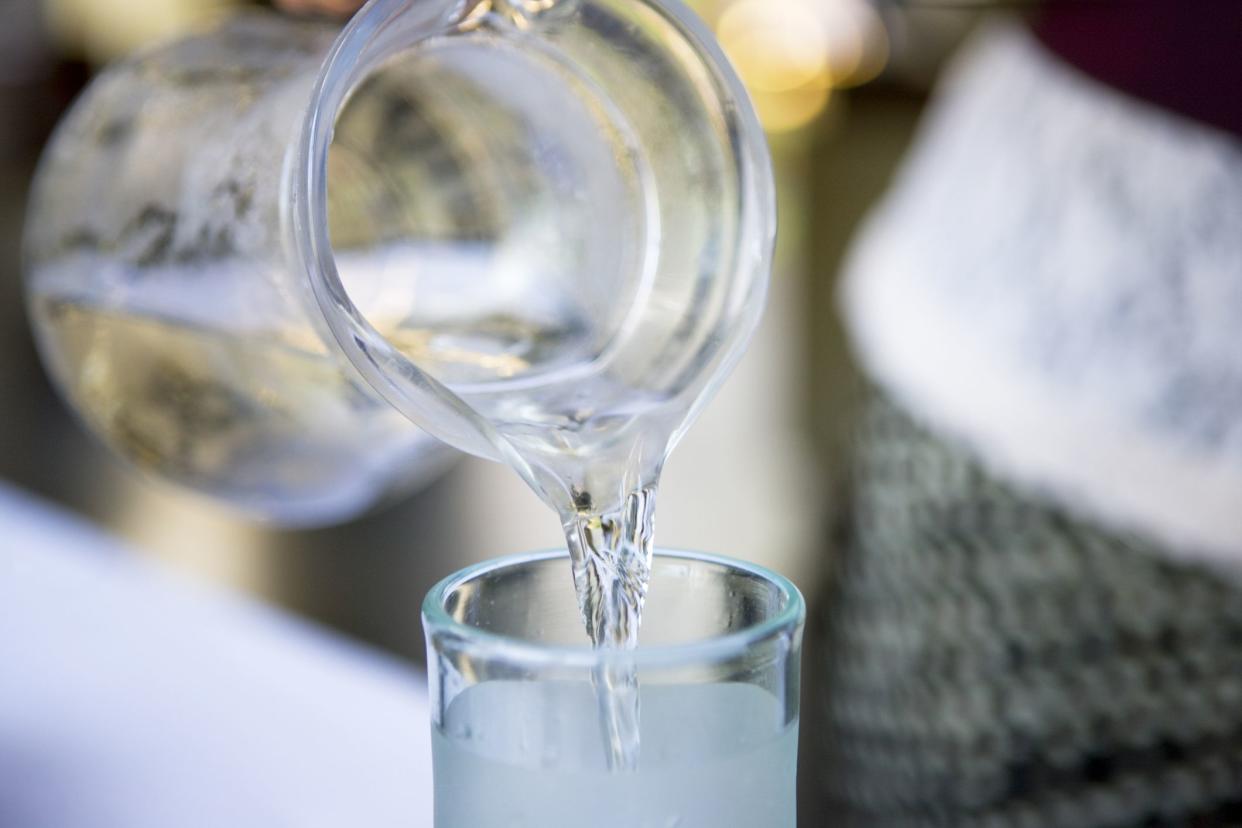
There’s no one best time to drink water for weight loss. That said, research suggests that drinking water before meals could help you eat fewer calories by:
Reducing hunger
Increasing satiety (feeling full)
Try drinking 17 ounces — about a pint glass — of water 30 minutes before meals.
A 2010 study compared eating a low-calorie diet and drinking 17 ounces of water before meals to eating just a low-calorie diet alone. Participants who drank extra water lost over four pounds more than the other group. This resulted in a 44 percent greater decline in weight over the 12-week study.
Outside of meal times, drink plenty of water throughout the day. And avoid waiting until just before bed to get in your daily water intake — otherwise, you’ll be setting yourself up for many middle-of-the-night bathroom trips.
webphotographeer/istockphoto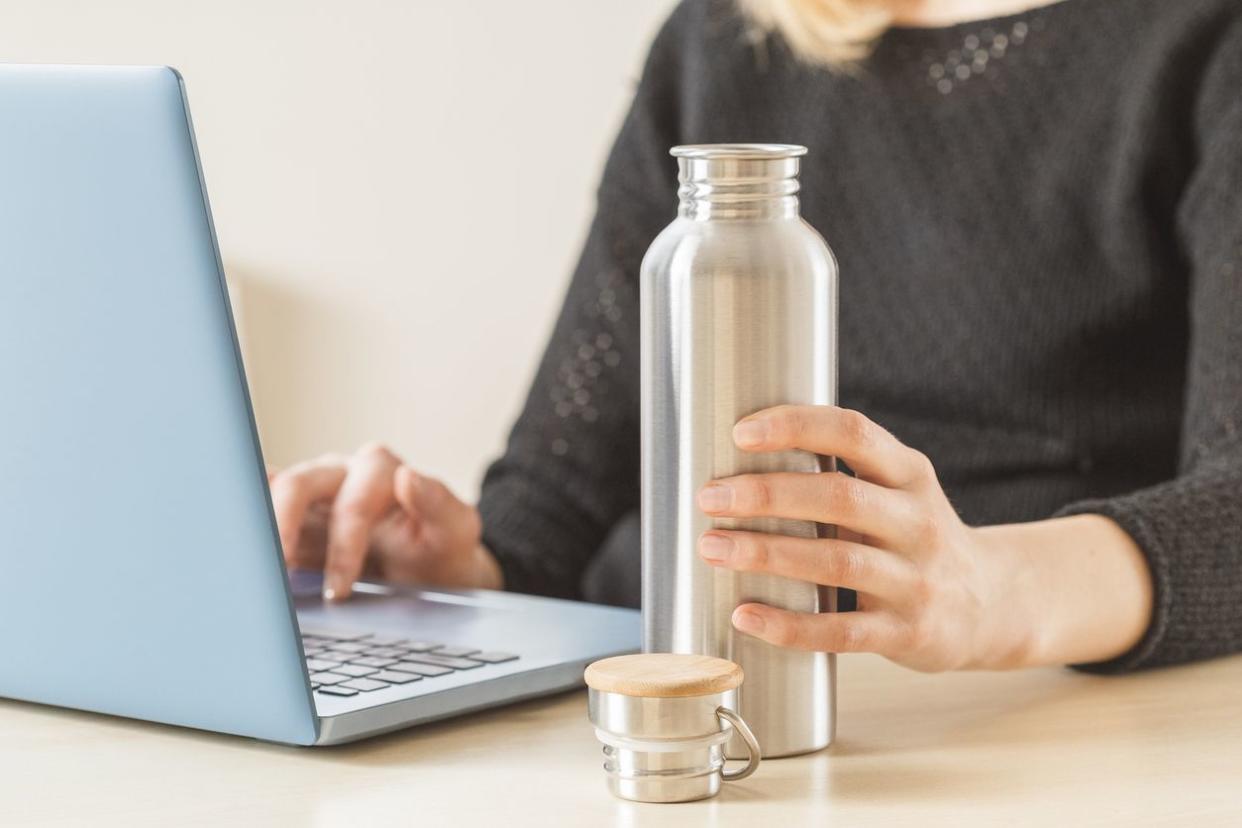
Now that we’ve established that drinking more water could help you lose weight, it’s time to start drinking up.
Here are our tips to increase your water intake:
Carry a water bottle with you everywhere — bonus points if it’s a reusable bottle you enjoy using.
Add a slice of lemon, lime or cucumber to your water if you don’t like the taste of it plain.
Drink water with meals — make it a non-negotiable on your dinner table.
Freeze bottles of water or add ice cubes to your glass to enjoy cold water.
Have a glass or bottle of water on your desk, next to the couch, in your gym bag, etc. Sometimes, you just need the visual cue to drink up.
Set reminders on your phone, download a water-drinking app (yep, those exist) or leave a Post-It note on your bathroom mirror.
Can you lose weight by drinking water? Sure. But water is just one piece of the weight loss puzzle.
Healthy diet, exercise, stress management and adequate sleep are all key to sustainable weight loss. If you decide to up your water intake, don’t forget about the basics.
If you’re looking to lose weight, here’s what you can try alongside drinking more water:
Reducing calories that come from fats and sugars
Increasing fruits and veggies
Eating a variety of lean protein
Getting at least seven hours of shut-eye a night
Getting two and a half hours of exercise throughout the week (or about a half-hour five days a week)
Chat with a healthcare professional for more personalized advice on your weight loss goals. Drinking water may be part of the strategy, but a meal plan, exercise routine, behavioral change tools or weight loss medication could also be useful.
AnSyvanych/istockphoto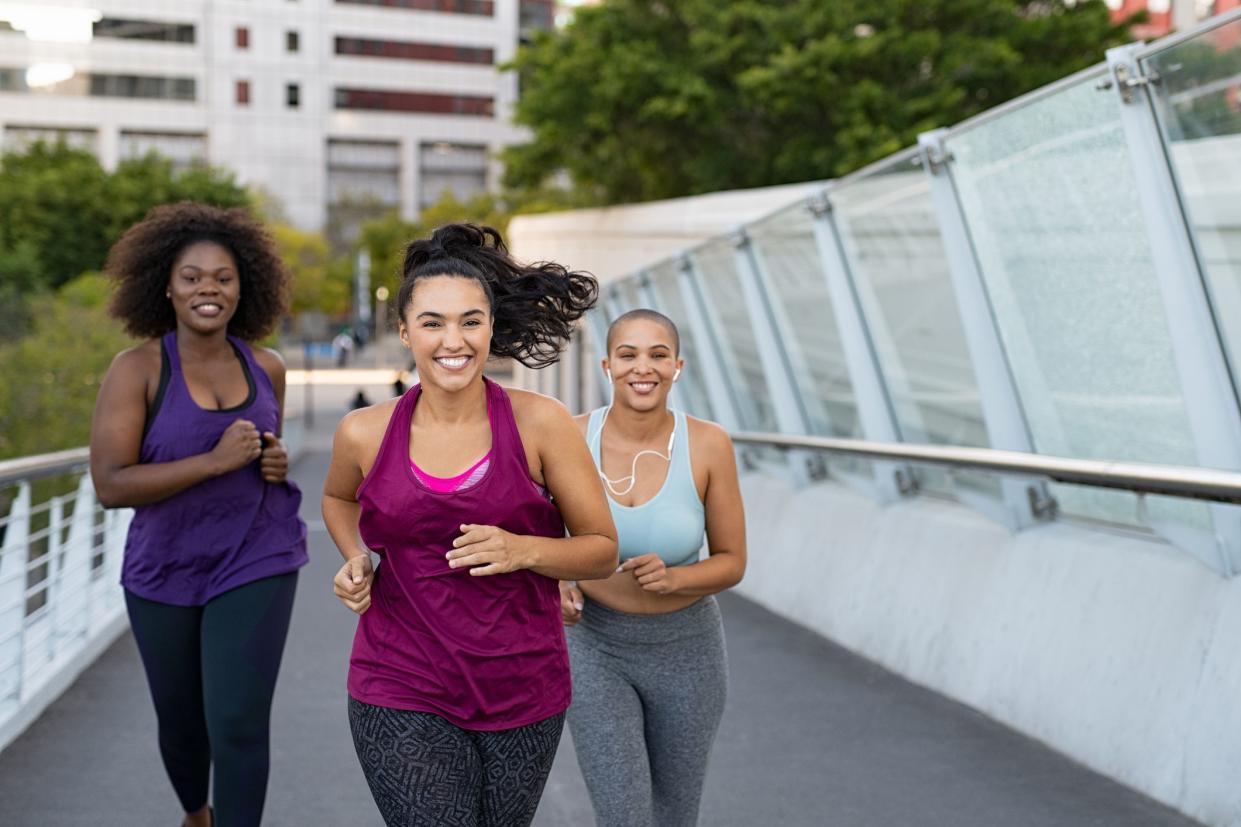
Does drinking more water help you lose weight? As it turns out, yes, it can. But weight loss isn’t the only benefit of drinking more water.
Water can help boost:
Mental performance and energy. When dehydrated, you may find it harder to concentrate and stay alert. Your short-term memory could take a hit too.
Physical performance. Dehydration can lead to reduced endurance, fatigue and increased perceived effort — not what you want when working out.
Overall health and wellness. Adequate hydration can reduce your chances of kidney stones, constipation, exercise asthma, urinary tract infections (UTIs), high blood pressure and possibly fatal coronary heart disease. It might also lower your risk of developing a headache. Water can even help your hair grow.
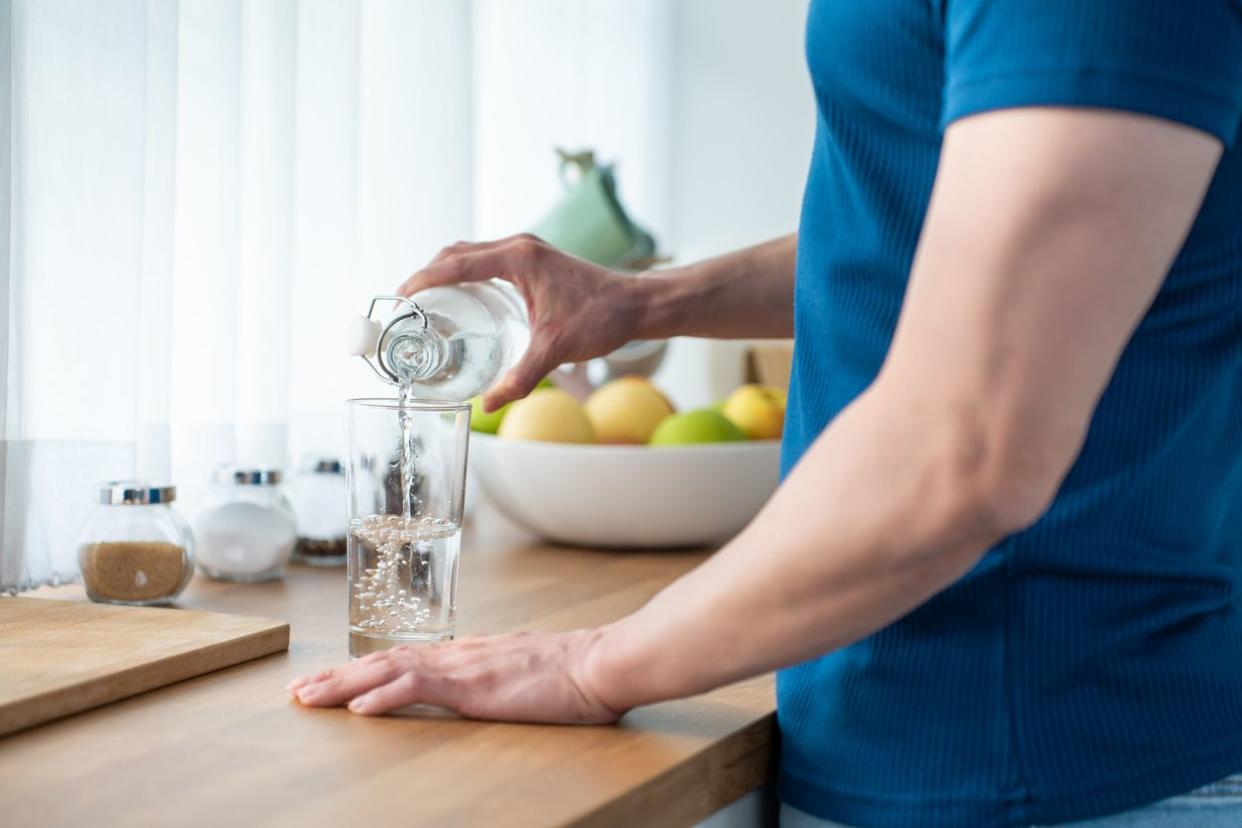
The rumors are true: Drinking water can help you lose weight.
Here’s what you need to know:
Drinking water has multiple benefits. It can reduce hunger, boost metabolism and increase fat oxidation while helping you stick to a workout plan. You might find you’re eating (and drinking) fewer calories when you start upping your water intake.
Drinking water before meals could help you eat less. A rigid water-consumption schedule may not be necessary. Still, you might try a glass or two about 30 minutes before meals. It could suppress your appetite, help you avoid overeating and make you feel more satisfied.
Don’t forget other essential factors for weight loss. If you’re drinking water to lose weight, don’t neglect diet, exercise, stress management and sleep. Weight loss often requires a multi-pronged approach. Don’t be afraid to reach out to a medical professional, dietitian or behavioral therapist for support and guidance.
It seems that good ol’ H2O can help you on your weight loss journey, but other weight loss treatments are out there. We recommend exploring your options to see what techniques might work and following the advice of a healthcare professional.
This article originally appeared on Hers.comand was syndicated by MediaFeed.org.
